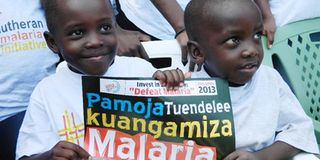New anti-malaria vaccine developed

Aliene Mitchel (left) and Enock Menelick of Diakonia Compassionate Ministry from Kisumu recite a poem to on April 26, 2013 to mark World Malaria Day Celebrations in Ahero, Kisumu County. A new malaria vaccine will be available next year, scientists in Kenya believe. This will help eradicate the disease. FILE PHOTO | JACOB OWITI |
What you need to know:
- Prof Bhatt was speaking at a Kenyatta National Hospital symposium where scientists discussed progress in the treatment of renal, cardiology, neurology and respiratory diseases, among others.
- The team working on the vaccine developed genetically engineered malaria parasites that are weakened by the precise removal of genes, that in turn prevents the parasite from inducing an infection.
- The World Health Organisation notes that the vaccine will be evaluated as an addition to and not a replacement for existing preventive measures such as bed nets and insecticide spraying.
A new malaria vaccine will be available next year, scientists in Kenya believe. This will help eradicate the disease.
Prof K.M. Bhatt, an infectious and tropical diseases expert, said Wednesday that a new vaccine had been tested with positive results and is expected in 2015.
The RTS vaccine prevents the malaria parasite from infecting, maturing and multiplying in the liver, from where it re-enters the bloodstream and infects red blood cells, leading to the disease.
Prof Bhatt was speaking at a Kenyatta National Hospital symposium where scientists discussed progress in the treatment of renal, cardiology, neurology and respiratory diseases, among others.
SHOWN EFFICACY
“The vaccine has shown about 46 per cent efficacy in a Phase 3 study in Africa and is one way to tame malaria, especially in specific populations such as pregnant women in malaria endemic areas who have a 50 per cent higher risk of infection.”
The vaccine is developed by GlaxoSmithKline and weakens the malaria parasite, plasmodium falciparum, which is prevalent in sub-Saharan Africa.
The team working on the vaccine developed genetically engineered malaria parasites that are weakened by the precise removal of genes, that in turn prevents the parasite from inducing an infection.
The Phase 3 trial started in May 2009 and was completed in 2011 on 15,460 children in Burkina Faso, Gabon, Ghana, Kenya, Malawi, Mozambique and Tanzania.
The World Health Organisation notes that the vaccine will be evaluated as an addition to and not a replacement for existing preventive measures such as bed nets and insecticide spraying.
Malaria kills an estimated 660,000 people worldwide, mostly in Africa, where one child dies from the disease every minute.
It causes anaemia in pregnant women, stillbirths, and low birth weight which increases the risk of death within the first days of the child’s life.





